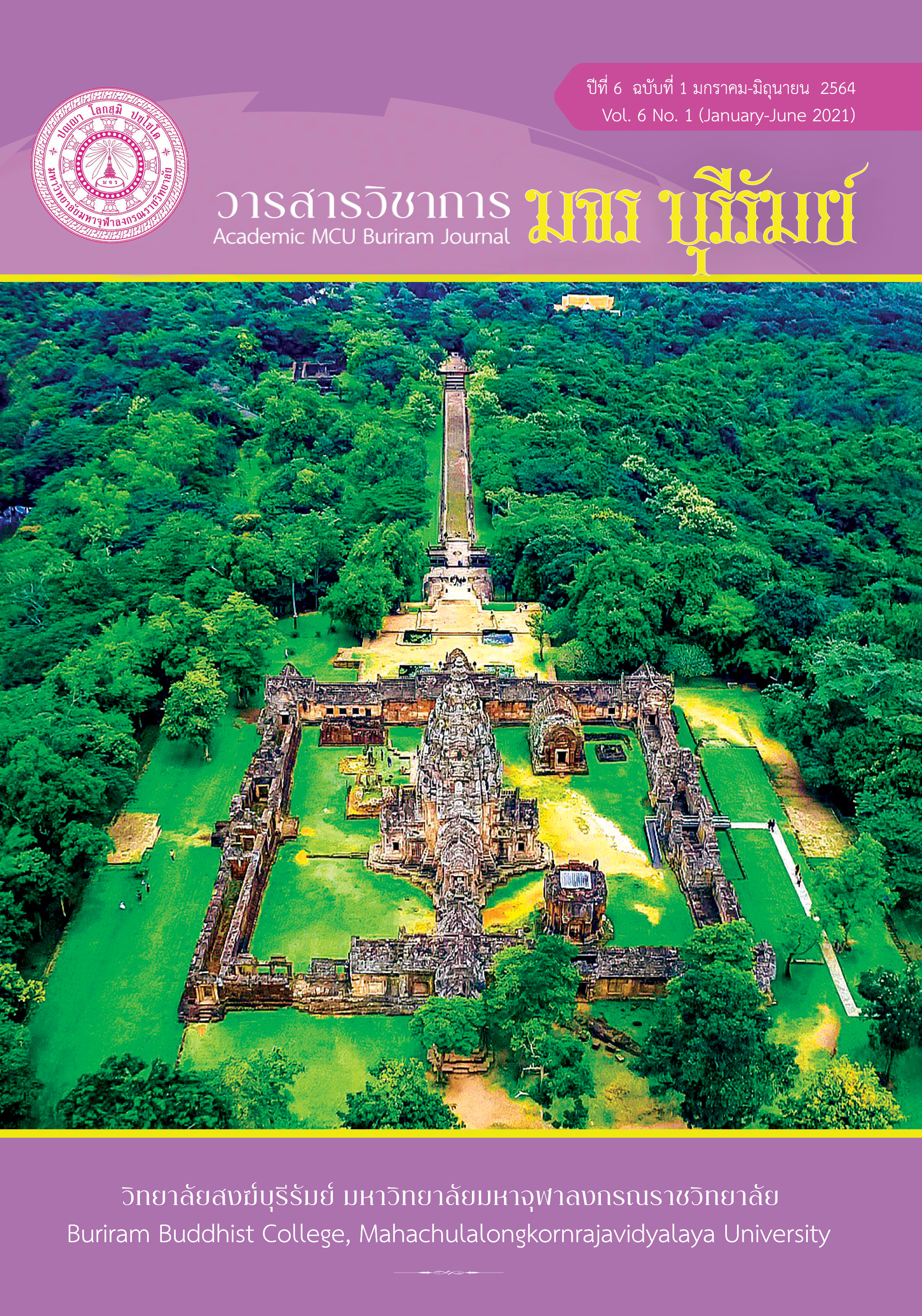The Guideline for Desire Morality to Youth of Moral Training Center Buddhist Camp, Wat Nongloeng, Kham khuean kaeo District, Yasothon Province in Situation of the COVID-19 Epidemic
Keywords:
Moral Cultivation, Buddhist Camp, COVID-19 EpidemicAbstract
This academic article aims to reflect two points of view: 1) to Study the Buddhist epidemic management of the Sangha in the modern era with the current situation, and 2) to study the moral instillation approach to youth of the Youth of moral training center Buddhist camp wat nongloeng Kham Khuean Kaeo district, yasothon province, in the situation of the COVID-19 epidemic. The results of the study found that the prevention of disease through the practice of hygiene in the ascetic practice of the austere practices 14 of Buddhist precepts. The Lord of Buddha has laid out the principles of good living that lead to taking care of and protecting himself from suffering and disease, whether fair, to promote humanity. Dharma to lead a life to flourish. Dharma to promote a good life together and dharma for monks and so on. The Buddha spoke about the practice that spoke about the manners, cleanliness and orderliness of the monks. and guidelines for promoting the organization of moral and ethical training activities in schools, such as encouraging schools to use the Buddha day as a moral training day for children and youth. Inviting monks from a temple near the school to give a lecture in front of flag. Encouraging children and youth to practice meditation 5-10 minutes a day before the first hour of classes every day. In order to cultivate children and youth to learn the practice of dharma. Understanding the importance of Buddhism and be able to apply good practices in daily life through the online system or in place where there is a screening, the location is safe from the infection between each other.
References
กรมการศาสนา กระทรวงวัฒนธรรม. (2556). คู่มือการจัดค่ายคุณธรรมเยาวชน. กรุงเทพมหานคร: จัดพิมพ์โดยกรมการศาสนา.
จรรยา ยุทธพลนาวี, ปริยฉัตร เวทยนุกูล และ วิภาวดี โก๊ะเค้า. (2563). ประวัติศาสตร์และวัฒนธรรมการจัดการโรคระบาดในสังคม. ศูนย์มานุษยวิทยาสิรินธร, แหล่งที่มา: https://www.sac.or.th/main/th/article/detail/127 (2 พฤษภาคม 2564).
บีนา กุตติพารามบิล. (2562). พัฒนาเยาวชนให้พร้อมรับมือกับอนาคตได้อย่างมั่นใจ. แหล่งที่มา: https://www.unicef.org/thailand/th/stories/ (1 พฤษภาคม 2564).
พระมหาไพจิตร อุตฺตมธมฺโม. (2563). ภาวะผู้นำเชิงพระพุทธในการแก้ไขปัญหาวิกฤตทางสังคม: กรณีศึกษาโรคระบาด. วารสารพุทธมัคค์, 5(1), 127-137.
พันธุ์ทิพย์ ธีระเนตร. (2563). โรคระบาดในประวัติศาสตร์ไทย เราผ่านพ้นมาได้อย่างไร. แหล่งที่มา: https://www.matichon.co.th/prachachuen/prachachuen-scoop/news (2 พฤษภาคม 2564).
มหาจุฬาลงกรณราชวิทยาลัย. (2535). พระไตรปิฎกภาษาไทย ฉบับมหาจุฬาลงกรณราช
วิทยาลัย. กรุงเทพมหานคร: มหาวิทยาลัยมหาจุฬาลงกรณราชวิทยาลัย.
สรวงมณฑ์ สิทธิสมาน. (2564). เด็กเกิดน้อย ต้องเพิ่มคุณภาพไม่ใช่ปริมาณ. แหล่งที่มา: https://mgronline.com/qol/detail/9640000015703 (1 พฤษภาคม 2564).
arayadusit. (2563). โรคระบาดสมัยพุทธกาล. แหล่งที่มา: https://www.blockdit.com (2 พฤษภาคม 2564).
Wate Bunnakornkul. (2563). ยุบ เลิก โรงเรียนร้าง เด็กเกิดน้อย: สังคมสูงวัย. แหล่งที่มา: http://dhamma.serichon.us/2020/05/31 (1 พฤษภาคม 2564).
Downloads
Published
How to Cite
Issue
Section
License
ทัศนะและความคิดเห็นที่ปรากฏในบทความวารสารฉบับนี้ถือเป็นความรับผิดชอบของผู้เขียนบทความนั้น ไม่ถือเป็นทัศนะและความรับผิดชอบของบรรณาธิการ





